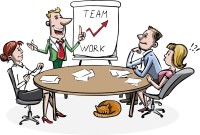- Home
- Business Processes
- Industry Knowledge
- Aerospace Industry
- Automotive Industry
- Banking Domain
- BFSI Industry
- Consumer/ FMCG Industry
- Chemicals Industry
- Engineering & Construction
- Energy Industry
- Education Domain
- Finance Domain
- Hospitality Domain
- Healthcare Industry
- Insurance Domain
- Retail Industry
- Travel and Tourism Domain
- Telecom Industry
- Leadership Skills
- eLearning
- Home
- Leadership
- Problem Solving
- What is Project Management
What is Project Management
Are you leading or involved in projects that are critical to your business or your team or your organization? What are the challenges you face while managing these projects? Do you feel yourself to be in control of the project and are able to track all deliverables to get successfully completed by the deadline? Do you have methodologies, clear processes, and systems in place to manage your projects? Are your projects able to meet the business objectives they intended to achieve?
This section of our website is targeted at individuals who manage projects as a primary function of their work. Continue with these tutorials to gain an operational understanding of the basic concepts and tools of project management as well as advanced tools to manage the real-world challenges you will face. We will start with the basic concepts and tools and slowly move to advanced topics improving your project management skills.
We will address the core concepts behind “Project Management” and help you navigate through the real-world challenges and troubleshoot problems that may be affecting your project team’s performance and work. We will give you tools to deal with miscommunications, conflicts, or sagging loyalties that get in the way of high performance. We will also give you an opportunity and toolkit to put those concepts into practice during the learning sessions.
Some of the objectives that we have tried to address while creating these tutorials are:
1. Exposure to real business projects with high business impact
2. How to create a well-defined project with clear deliverables
3. Tools and concepts behind defining project scope, detailed guidelines
4. Moving from theoretical concepts to a great learning experience
5. Short and precise structured course output
6. Exposure to best practices and good use of project management tools
7. How to leverage very good teamwork during projects
8. How to ensure the impact of the project on pre-defined business objectives?
9. Ensuring that the participant learn & apply project management tools & techniques
10. Time & commitment impact – for the participant, you and for your team
11. Impact of learning on your role - does participant is able to apply some of the skills & knowledge learned on actual job
12. Developing people and ensuring the learning has an impact on the performance
13. Help participants better understand the strategy & challenges of their own businesses
14. Tools to make people aware of cultural differences between geographies/businesses
15. Enhancing the ability to see the big picture
16. Increased hands-on knowledge & understanding of other functions within the organization
17. Understand the power of best practice sharing - “participant will start looking for connection within the business before doing things by himself”
18. International best practices that can be applied in business projects
19. Guidance on applying tools & knowledge
20. Increased self-confidence - “Participant is now able to voice her opinion & challenge others in the meeting. He/She drives project more proactively”
21. An eye-opener on a variety of career paths “participant is realizing there are other options available for them than a current role for her next move”
22. Noticeable improvement in leadership skills
23. The participant is using the new network to get fresh ideas/advice
24. The project gave visibility & exposure to the participant
25. Developing presentation skills
26. Tools to evaluate what can be done differently
27. Practical, real-world project management examples (Customer Focus)
28. Career Benefits - More & wider responsibilities within the same department; New role (lateral move, promotion); Move to the management role
29. Make participants aware that the higher they go, the more they will have to work on things in parallel
30. How do you manage everything; how do you set priorities, resources, etc.?
31. Prepare participants for bigger roles; How to deal with uncertainty?
32. Other areas of development - Teamwork … collaboration…
Related Links
You May Also Like
-
Time management is the process of planning and exercising conscious control of time spent on specific activities, especially to increase effectiveness, efficiency, and productivity. The best time management techniques improve the ways you work. Time management refers to managing time effectively so that the right time is allocated to the right activity. Learn more about the five steps for effective time management viz. study, identify, analyze, decide, and implement.
-
A manager or an employee in an organization who is experiencing a high level of stress may develop high blood pressure, ulcers, irritability, difficulty in making routine decisions, loss of appetite, accident proneness, and the like. These can be subsumed under three general categories, physiological, psychological, and behavioral symptoms. Stress can give rise to a number of changes.
-
Collaborative leadership is all about collaborative problem-solving and decision-making or can also be defined as the leadership of a collaborative effort. . The term started to appear in the mid-1990s in response to the formation of long term public-private partnerships to rebuild public infrastructure. Learn how you can use principles of collaborative leadership to enhance your leadership skills for being an effective leader.
-
Generating Ideas using SCAMPER
SCAMPER is an activity-based thinking process that can be performed by Cooperative learning. SCAMPER is an acronym that provides a structured way of assisting students to think out of the box and enhance their knowledge. This can be used in the organizational context as a technique for creative problem solving and as a toolkit to generate fresh ideas.
-
Building Perfect Creative Team
One misconception around creativity is that creative act is essentially solitary. Most of the world's important inventions resulted not from the work of one lone genius, but from collaboration of a team with complementary skills. Managers should build teams with the ideal mix of traits to form a creative group and then establish the conditions that make creativity much more likely to occur.
-
Tips for Effective Time Management
After studying and analyzing how time is spent, why time is wasted, and where time is wasted you need to decide about the changes required for effective utilization of time. For this purpose, a large number of remedial measures can be taken by you. The first and foremost determinant of a planned and purposeful utilization of time is to develop consciousness of the value of time at all levels of the organization. Planning, goal setting, and defining priorities are concerns to addressed immediately.
-
Tools for Developing Your Team
If a manager has too many weak spots in the talent of the team, the ability to empower the team members to independently execute the project is impaired. Assignments fall behind schedule or stretch out because the needed skills or knowledge are not in place when needed. To successfully execute important projects, hiring talented people, and increasing the talents of existing staff are most important.
-
Effective Business Communication
Communication is all about getting the message across correctly. To make this happen, you need to have good speaking skills and good writing skills. If you have these skills coupled with good listening skills and interest in reading, you have all the potential to be a good communicator. What things should the leader take into consideration to be more effective with interpersonal communication?
-
In today's business world, proficiency in management skills is essential for career growth and success. Managerial skills can be defined as attributes or abilities that are essential for every leader and manager to succeed and fulfill specific tasks expected from them by the organization.
-
Communication is defined as the process of meaningful interaction between two or more persons with a view to arriving at a common meaning and understanding. There are different types of communication and these are used on different occasions. In this section on communication skills, Technofunc will equip you with the skills most needed in today’s dynamic, demanding workplace.
-
Productivity is defined not in terms of the number of goods produced, but in terms of value-added per employee. Customers don’t really buy goods and services but in fact, they buy a value - something they value. The future is all about tangible products fulfilling intangible needs. Ideas like this can transform a business and provide them a competitive advantage to thrive in the future.
-
Listening is the foundation for good communication. It is also the hardest skill to master. Do you listen to confirm what you already know, or do you listen to explore and learn new things? How can we create receptive communication as a listener? The real art of listening involves awareness and sensitivity to the feelings of the speaker because it is at the feeling level that genuine connection, relationship, and healing occurs.
-
Change is a complex phenomenon. There are different types of changes that are going on around us. Listed in this article are twelve areas in which change arises and bring some classification to it. However one may classify the change, the various heading is always interrelated. The change could be triggered by market changes, technological changes, or organizational changes.
-
Facilitative Leadership is all about involving the employees in the decision-making process at all levels enhancing their sense of ownership, responsibility, and motivation. Facilitative leadership style uses a number of indirect communication patterns to help the group reach consensus and build commitment for the decision taken. To be effective in modern organizations, managers need to become facilitative leaders, learn what it means to be a one.
-
Are you leading or involved in projects that are critical to your business or your team or your organization? What are the challenges you face while managing these projects? Do you feel yourself to be in control of the project and are able to track all deliverables to get successfully completed by the deadline? Do you have methodologies, clear processes, and systems in place to manage your projects? Are your projects able to meet the business objectives they intended to achieve?
Explore Our Free Training Articles or
Sign Up to Start With Our eLearning Courses

About Us
Learning
© 2023 TechnoFunc, All Rights Reserved















